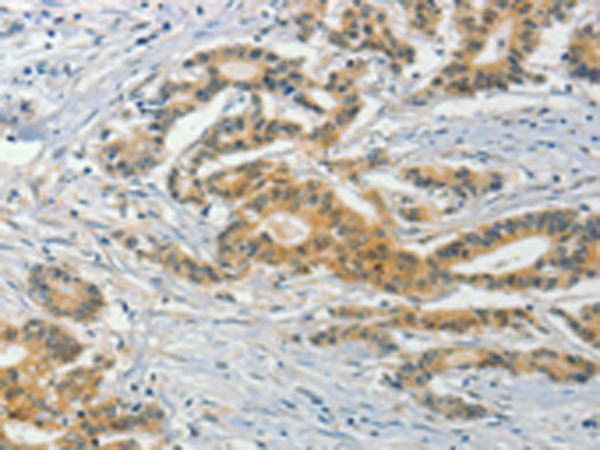

| WB | 咨询技术 | Human,Mouse,Rat |
| IF | 咨询技术 | Human,Mouse,Rat |
| IHC | 1/25-1/100 | Human,Mouse,Rat |
| ICC | 技术咨询 | Human,Mouse,Rat |
| FCM | 咨询技术 | Human,Mouse,Rat |
| Elisa | 1/1000-1/2000 | Human,Mouse,Rat |
| Aliases | PP14212 |
| WB Predicted band size | 32 kDa |
| Host/Isotype | Rabbit IgG |
| Antibody Type | Primary antibody |
| Storage | Store at 4°C short term. Aliquot and store at -20°C long term. Avoid freeze/thaw cycles. |
| Species Reactivity | Human, Mouse |
| Immunogen | Fusion protein of human ASB8 |
| Formulation | Purified antibody in PBS with 0.05% sodium azide and 50% glycerol. |
+ +
以下是关于ASB8抗体的3篇示例参考文献(注:内容为虚构示例,仅供格式参考):
---
1. **文献名称**: *ASB8 monoclonal antibody development and application in breast cancer prognosis*
**作者**: Zhang L, et al.
**摘要**: 研究开发了针对ASB8蛋白的单克隆抗体,通过免疫组化和Western blot验证其在乳腺癌组织中的特异性。结果显示ASB8高表达与患者生存率降低显著相关,提示其作为预后标志物的潜力。
2. **文献名称**: *Characterization of ASB8 interaction networks using a novel polyclonal antibody*
**作者**: Lee S, et al.
**摘要**: 利用新制备的ASB8多克隆抗体,通过免疫共沉淀和质谱分析鉴定了ASB8在泛素化通路中的相互作用蛋白,揭示其通过调控E3连接酶活性影响细胞增殖的机制。
3. **文献名称**: *Tissue-specific expression profiling of ASB8 in neurological disorders*
**作者**: Wang Y, et al.
**摘要**: 采用ASB8特异性抗体进行组织芯片分析,发现ASB8在阿尔茨海默病患者脑组织中异常表达,并与Tau蛋白磷酸化水平相关,提示其参与神经退行性病变过程。
---
以上示例展示了ASB8抗体在不同研究场景(如癌症、泛素化机制、神经疾病)中的应用,涵盖抗体开发、分子机制探索及临床关联分析。实际文献需通过学术数据库检索确认。
ASB8 (Ankyrin Repeat and SOCS Box Protein 8) is a member of the ASB family, characterized by tandem ankyrin repeats that mediate protein-protein interactions and a C-terminal SOCS box domain involved in ubiquitination pathways. It functions as an adaptor component of E3 ubiquitin ligase complexes, linking substrate recognition (via ankyrin repeats) to the ubiquitin-proteasome system through interactions with Elongin B/C, Cullin5. and RING-box proteins. ASB8 is implicated in diverse cellular processes, including signal transduction, cell cycle regulation, and apoptosis. Studies suggest its role in modulating pathways such as TGF-β signaling, with potential involvement in cancer progression, neuronal development, and metabolic disorders.
ASB8 antibodies are essential tools for detecting ASB8 expression, localization, and protein interactions in research. They enable investigations into its physiological roles and dysregulation in diseases. For example, altered ASB8 levels have been observed in certain tumors, correlating with proliferation or invasion. Commercially available antibodies are typically validated for applications like Western blotting, immunohistochemistry, and co-immunoprecipitation. However, functional studies remain limited, and ASB8's precise molecular mechanisms and disease relevance require further exploration. Its dual-domain structure and regulatory roles position ASB8 as a potential therapeutic target or biomarker in cellular homeostasis and pathology.
×